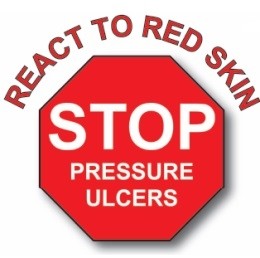React to Red

Pressure ulcers are a major cause of harm and distress. They are serious, localised injuries to the skin and/or underlying tissue as a result of pressure, or pressure in combination with shear. They have a huge impact on a patient’s quality of life leading to increased pain, risk of infection, depression and even death.
We are committed to supporting carers in providing best care and are participating in the NHS England and Improvement work to roll out the React to Red initiative in care settings.
Pressure ulcers cost the NHS and care organisations in the UK around £6.5 billion per year, affect around 700,000 people every year and yet many pressure ulcers are avoidable if simple knowledge is provided and preventative best practice is followed.
The React to Red campaign focuses on supporting care homes and domiciliary agencies across North Yorkshire and York.
React to Red includes an education package using a simple yet effective framework which supports carers in recognising when an individual may be at increased risk of pressure ulcer development and the simple steps that can be taken to avoid them.
 The full evaluation document for the project can be viewed here.
The full evaluation document for the project can be viewed here.
The framework known as ‘SSKIN’ prompts carers to consider key areas important in maintaining skin integrity.
SSKIN stands for:
Surface - what mattress/cushion does the individual need?
Skin Inspection - regular skin inspection and empower individuals to check and report if possible
Keep Moving - repositioning and regular movement
Incontinence/moisture - prevention of moisture damaging the skin
Nutrition - optimum nutrition and hydration
Additional resources:
VIDEO: The five key messages to prevent pressure ulcers (from Shropshire Community Health NHS Trust)
For further information please contact hnyicb-voy.yorkplacequalitynursingteam@nhs.net
Other Care Provider pages
- Improving Hydration in care Home Residents
- Recognising and Responding to Deterioration in Residents
- React to Falls Prevention
- Hand Hygiene and PPE
- Oral Health training
- Nutrition
- Partners in Care Prompt and Information Cards
- Digital Care Telemedicine Service for Care Homes
- Capacity Tracker
- Conferences and Webinars
- Care Connected
- Partners in Care Bulletins
- North Yorkshire and York Care Provider Olympics
- Alerts for Care Providers
- PERSON Approach
- Useful links and resources
- Student Placements
- Registered Nurses in Social Care
- Research



